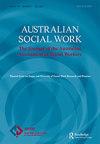Contemporary Practitioner Experiences of Relational Social Work: The Case of Child Welfare
IF 2
3区 社会学
Q2 SOCIAL WORK
引用次数: 4
Abstract
ABSTRACT Relationships are core to effective social work and provide the glue that binds diverse aspects of practice. Relational practice has come under threat in an era of managerialism, yet at the same time, it is undergoing a revitalisation in social work discourse. For practitioners on the ground, this can create something of a dilemma, because while their discipline steers them towards building relationships in their practice, their efforts are often unsupported by their organisations, which potentially adds to their workload. This paper presents Australian research that was designed to explore how social work practitioners in the child welfare field experienced the emotional labour involved in building and maintaining relationships in organisational environments characterised by economic and technical rationalism. In-depth interviews were used to explore how participants managed their feelings and the findings revealed how they had to “dig deep” into personal and professional resources to connect and converse with clients and colleagues in a meaningful way. When considered through a gendered lens, this issue raises questions about the ethics of workload distribution for relational work in a profession that is predominantly female. IMPLICATIONS The process of building relationships can be undermined by organisational environments that are heavily influenced by managerial principles and this can potentially threaten the ethos of relational practice. Practitioners need to sustain critical reflection on the value of relationships in order to maintain focus on them. Considering this issue through a gendered lens raises questions about the ethics of care afforded to practitioners.关系社会工作的当代实践者经验:以儿童福利为例
人际关系是有效社会工作的核心,是将实践的各个方面结合在一起的粘合剂。关系实践在管理主义时代受到威胁,但与此同时,它在社会工作话语中正在经历复兴。对于现场的从业者来说,这可能会造成某种困境,因为当他们的规程引导他们在实践中建立关系时,他们的努力往往得不到组织的支持,这可能会增加他们的工作量。本文介绍了澳大利亚的一项研究,该研究旨在探索儿童福利领域的社会工作从业者如何在以经济和技术理性主义为特征的组织环境中建立和维持关系所涉及的情绪劳动。深度访谈被用来探索参与者如何管理自己的情绪,调查结果揭示了他们如何“深入挖掘”个人和专业资源,以一种有意义的方式与客户和同事建立联系和交谈。从性别角度来看,这个问题提出了一个问题,即在一个以女性为主的职业中,人际关系工作的工作量分配是否合乎道德。建立关系的过程可能会受到组织环境的破坏,这些环境受到管理原则的严重影响,这可能会潜在地威胁到关系实践的精神。从业者需要保持对关系价值的批判性反思,以保持对关系的关注。考虑到这个问题,通过性别的镜头提出了有关医护人员的道德问题。
本文章由计算机程序翻译,如有差异,请以英文原文为准。
求助全文
约1分钟内获得全文
求助全文
来源期刊

Australian Social Work
SOCIAL WORK-
CiteScore
4.20
自引率
16.70%
发文量
37
期刊介绍:
Australian Social Work is an international peer-reviewed journal reflecting current thinking and trends in Social Work. The Journal promotes the development of practice, policy and education, and publishes original research, theoretical papers and critical reviews that build on existing knowledge. The Journal also publishes reviews of relevant professional literature, commentary and analysis of social policies and encourages debate in the form of reader commentary on articles. Australian Social Work has grown out of the Australian context and continues to provide a vehicle for Australian and international authors. The Journal invites submission of papers from authors worldwide and all contributors are encouraged to present their work for an international readership.
 求助内容:
求助内容: 应助结果提醒方式:
应助结果提醒方式:


